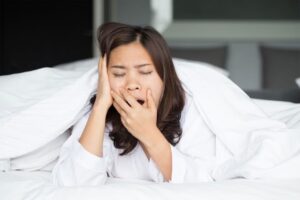If you work an early shift, have class first thing in the morning, or frequently attend meetings before noon, you may have found yourself wondering how to become a morning person. While some people perform their best in the early hours of the day, others might need a few hours before feeling fully alert and focused.
Your chronotype describes whether you prefer the morning or evening hours. Even if you have always been at your best in the evening, adjusting your chronotype and becoming a morning person is possible. We explore how to become a morning person and love it by making small changes in daily routines.
Why Your Chronotype Matters
Chronotype is a term that describes a person’s natural inclination toward feeling productive in the morning or evening. Your chronotype is rooted in your genetic background. Although your chronotype may change throughout the course of your life, you can’t purposely change or retrain it.
Four chronotypes have been identified, all corresponding with the sleep-wake habits of certain animals. More than half of the population has the bear chronotype, which is defined by waking with the sunrise and winding down in the evening. Bears are most productive between 10 a.m. and 2 p.m.
Lions and wolves are each found in roughly 15% of people. Lions wake up in the early morning with peak productivity before noon, then retire in the early evening and fall asleep by 10 p.m.
Wolves are akin to “night owls,” waking up in the mid-morning and feeling most productive in the afternoon. Many wolves stay up past midnight on a regular basis.
Dolphins are the rarest chronotype, making up about 10% of the population. In nature, dolphins remain somewhat alert while sleeping — a defense mechanism against predators — and people with this chronotype often struggle with sleep fragmentation. The slightest noise or light exposure disrupts their sleep, and many have insomnia.
Pinpointing your chronotype can help you create a realistic daily routine based around your window period of peak productivity. Working against your chronotype can result in loss of productivity. If you’re a wolf, for example, attempting to be productive in the morning goes against your biological programming and may yield negative results.
Dr. Michael Breus created a chronotype quiz that assesses attitude, personality, diet, and sleep history.
Find Your Chronotype
Chronotype QuizThis quiz characterizes people into one of four chronotypes: dolphin, lion, bear, or wolf.
Your chronotype is related to circadian rhythms, which are 24-hour cycles controlled by your internal biological clock. Circadian rhythms influence a variety of processes in the body, including when you feel tired and when you feel alert — a dynamic known as the sleep-wake cycle. Light and other environmental factors influence your circadian rhythm, telling your body when to produce hormones that induce sleepiness. Your circadian rhythm essentially works with your genetic chronotype to control how sleepy or awake you feel throughout the day.
Tips for Becoming a Morning Person
Even if you have always been a night owl, becoming a morning person is possible. Try to gradually shift your preferences by making small, consistent changes over time.
Make a Consistent Sleep Schedule
Going to bed at the same time every night makes it easier to fall asleep. Likewise, maintaining a consistent wake-up time trains the body to be alert first thing in the morning.
While it might be tempting to stay up late and sleep in on the weekends, doing so may indicate social jet lag. Social jet lag occurs when a person’s circadian rhythms are misaligned with their work or school schedules. Sleeping more on the weekends to make up for getting insufficient rest during the week could reinforce disrupted sleep cycles.
Have a Relaxing Nighttime Routine
Evidence suggests that a bedtime routine can help people unwind and sleep better. In one study, individuals who reduced light and noise exposure two hours before bed and maintained an evening personal care routine experienced improved sleep.
Try to incorporate soothing, low-key activities into your evening routine, like reading, meditating, or listening to relaxing music. Relax and enjoy building positive associations with bedtime.
Avoid using electronic devices like computers, tablets, and cell phones in the half-hour before sleeping. These devices emit blue light, which can disrupt the production of melatonin, a hormone that triggers sleepiness. If you use electronics in the evening, consider wearing blue light-blocking glasses or installing a blue light-blocking app on your device.
Gradually Go to Bed Earlier
A significant part of becoming a morning person involves training yourself to fall asleep earlier. Once you have established a consistent sleep schedule and a regular evening routine, begin to gradually shift your bedtime earlier.
Try moving your bedtime earlier in 15-minute increments, until you can comfortably fall asleep at your chosen time. Your internal clock may adapt more easily to slow, measured adjustments instead of abrupt changes to your schedule.
Wake Up to Natural Light
Light is the strongest external factor impacting your sleep schedule. The brain relies on light and darkness to tell the body when to wake up and when to sleep. Since light shapes circadian rhythms, strategically timing your light exposure may help shift your internal clock. Just one hour spent in bright light can trigger a 30 to 60-minute change in circadian rhythms.
Take in natural light first thing in the morning by keeping your curtains or blinds open. Try to place your bed in a spot that catches the sunlight. If you are not able to do so, consider using a lamp with a timer or a smartphone app that lets you wake up to bright light.
Develop a Positive Morning Routine
Make waking up early enjoyable by giving yourself something to look forward to. Give yourself enough time to make breakfast, have a cup of coffee or tea, or stop by a favorite restaurant or cafe. Waking up to upbeat music or even smelling certain scents can help get your day started on a positive note.
You may also find it helpful to plan your morning the night before. Streamline your morning routine by laying out your clothes for the next day before you go to bed and placing any necessary items together in a designated place. Less rushing around may mean less anxiety and a positive start for the day.

Exercise Regularly
Daily exercise is important for healthy sleep. Studies indicate that regular exercise may help people fall asleep faster, get better rest, and stay asleep longer.
Exercise might also be able to aid in shifting circadian rhythms. In particular, exercising in the morning or evening may help people with late chronotypes shift their sleep schedule earlier. Exercising in the evening could negatively impact the sleep schedule of morning people, however.
Limit Caffeine to Early in the Day
Drinking caffeine within six hours of going to bed can make it hard to fall asleep. If you enjoy drinking coffee or tea, try making caffeinated drinks a part of your morning routine. You might sleep better after cutting out evening caffeine, while caffeine in the morning may boost alertness when you most need it.
Avoid Large Meals Before Bed
Along with caffeine, heavy evening meals and drinking alcohol before bed can disrupt sleep. While a large dinner or a few drinks might initially make you feel more sleepy, they can keep you awake later in the night. Drinking alcohol causes some people to wake up later in the night or sleep lightly, reducing the amount of sleep they get overall.
Reward Yourself for Reaching Small Goals
Change can be difficult, and adapting to a new sleep schedule can take time. It is important to celebrate your small accomplishments and try not to feel discouraged if you do not change your sleeping habits as quickly as you would like. While the process of becoming a morning person might feel slow, developing healthier habits will benefit you in the long term.
References
Get Your Sleep Questions Answered Live on 4/30
Have questions about sleep? Get all your sleep-related questions answered in a Live Q&A on YouTube with renowned sleep expert Dr. Michael Breus at 5 p.m. PST/8 p.m. EST.







